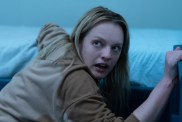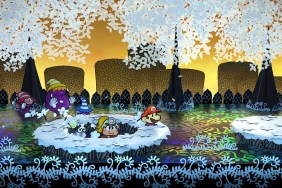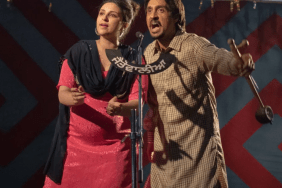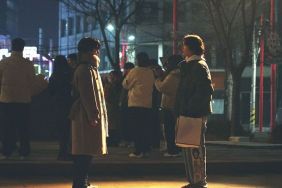From his 1994 U.S. breakout with Four Weddings and a Funeral through his turn at helming a “Harry Potter” movie with “Goblet of Fire” in 2005, director Mike Newell has led an incredibly eclectic film career following nearly a thirty-year career directing British television. While he’s never stayed in one place or genre, dealing with gangsters in Donnie Brasco and a ’50s girls’ university in Mona Lisa Smile, there probably hasn’t been as surprising a turn in his career as his latest. For his latest movie, the veteran director traveled down to Columbia to bring Gabriel Garcia Marquez’s classic romantic novel Love in the Time of Cholera to life with Javier Bardem taking the role as the chronic romantic Florentino Ariza who falls in love with the beautiful Fermina–played by Italian actress, and four-time David di Donatello Award nominee, Giovanna Mezzogiorno. The young man then spends fifty years waiting for her to finally return the feelings, in that time, sleeping with 600 other women and yet, in his mind, still remaining faithful to Fermina and his oath of fealty.
ComingSoon.net had a chance to sit down with Newell on a quite afternoon following the New York junket for his movie, and he told us how adapting Marquez’s novel was an even bigger challenge than one might think after seeing the scope of the film.
ComingSoon.net: “Harry Potter” was about two or three years ago, now, so did you go right from that into this movie?
Mike Newell: Yeah, I did, I went straight into it. I got off the plane from the Japanese premiere and went literally from the airport to work on the script with the writer and Scott (Steindorff, the film’s producer).
CS: They had been developing it for a while beforehand I assume. Was it something you had been circling at one point and then finally had a chance to do?
Newell: No, This is what happened. I had known the book somewhat. I’d half read it when it first came out. When I heard that it was being made, I was very anxious to have something that was a colossal contrast to what I’d done before. I wanted to do something about as it were real people rather than fantasy, and so I started to chase it. The only person that I could come up with who I could actually go and see and say, “Can I put my hand in the ring, please?” was Ronnie Harwood, who was the writer who lived and was writing it in England. So that’s what I did. I went and saw him and he said, “Well, I’m not the man to convince people because I’m only the writer, but here’s the producer’s number.” I started to chase it from that point on assuming that it would properly go to Alfonso Cuaron or Walter Salles or one of those great South American guys. Somehow or another, and I don’t know how, I got lucky.
CS: You said you wanted to do something different, but really, all of your movies are very different and you have such a wide range
Newell: But they all seem kind of clearly to have the same background for me. I know it doesn’t happen for other people, but because I’m English and because I had a kind of literary bent when I was young–I read English literature at University and so forth–I became familiar and energized by character. That happens a lot in England. The character is the way into a story and the characters in this were absolutely wonderful. Whether it’s “Harry Potter”, or “Donnie Brasco,” or “Four Weddings,” you can always say that a way of describing the story is it’s a story of a good man in a bad jam. This is a very, very complicated form of a good man in a bad jam story. It seems to me to be consistent, it doesn’t to other people, but it does to me.
CS: Did this seem at all like a challenge after doing “Potter”? For instance, you’d have to cast all these actors who would have to age over the course of the movie, shooting in Columbia, but you knew that going in assume?
Newell: Colossal. Huge! Yes, I did, although I don’t think I knew quite the extent of it, because they hadn’t had a movie made in Cartagena for twenty-five years. The last film in there being “The Mission”.

CS: Really? So they didn’t have any film crews down or anything readily available?
Newell: Nada. That of course turned out to be more of a challenge than we thought it was going to be, but what nobody reckoned on was the heat and the humidity, which is colossal. That was a huge difficulty with the makeup, because no matter what you put on the skin–and sometimes you put little gelatin pads that make the old skin wrinkle–but the skin will sweat under so it starts to slide. Sometimes, at the end of the day you would find that this stuff was dragging down there and it looked like something from a Vincent Price movie.
CS: So basically, there was a lot of fast shooting, fix up the make-up and shoot again?
Newell: Yes, and it was a big problem because if you don’t believe that these people have gone through fifty years of their lives than you’ve lost the whole thing. The way the story works is that the woman who you think is gloriously gifted and has the great social marriage, rich, successful, all of that and at the end of it after her husband has died, she can say to him, “I’ve had a good marriage, but I’ve had no idea whether it was love or not.” Whereas the other character who is much less blessed, but who works his way up, fights his way up to her.
CS: Well, he sleeps with over 600 women, so he must be somewhat blessed.
Newell: Well, yeah, dead right. But he knows that he’s won, that it’s a great positive ringing endorsement of his love. It’s a wonderful collision between those two characters.
CS: The casting must have been crucial to the film. Obviously, you have Catalina who is from Colombia originally and John Leguizamo, but you ended up casting an Italian, a Spaniard, a lot of Americans. While you were filming down there, they must have known the book inside out, since the book is huge down there
Newell: Yes, of course they did. It’s a very serious national treasure and we had lots and lots of actors from Colombia, not just Catalina and John. A tremendous number of the mid-range players were from Colombia and marvelous. I absolutely loved them. I admired them. I thought they were wonderful actors. There’s the kind of thing in the Irish where there’s no such thing as a bad Irish actor, and I think it’s the same with Colombia.
CS: That’s pretty amazing, considering that there hasn’t been a movie shot down there in twenty-five years.
Newell: Yeah, but you’ll see they are alive and well and living in TV up in Bogota. They work, it’s just they don’t work down there and in movies. Where were we? Talking about actors
What I wanted to do was, having realized that I couldn’t do the kind of Hollywood route–because the actors just weren’t there–and also, if you put a great big Hollywood actor who will save your bacon commercially inside a cast of people who you haven’t heard of, then you’ve got very awkward disproportionate mess. We tried then simply to cast the very best Latin actors that we could lay our hands on and each of those people speak Spanish to some extent, and for most of them Spanish is their first language. I mean, even Laura Harring has a Mexican mother and speaks Spanish like a native, Ben (Bratt) has a Peruvian mother and speaks Spanish like a native.

CS: But you’re doing the movie in English, rather than Spanish, so that doesn’t really matter that you have these great Spanish-speaking actors.
Newell: No I know, but I’m afraid I couldn’t direct it in Spanish and I was selfish enough to allow that to matter to me. Also, it’s not just that, it wasn’t just me directing it. The money was American money, some of it, quite a lot of it Hollywood money, and those guys, they do not countenance, they’re frightened of foreign language. They say a foreign language film is a foreign language film, and we can point to you that it will make so much money, whereas an English language movie will tend to be much more successful.
CS: It also should play better in non-Spanish speaking portions of Europe I’d imagine, but did you ever think about making two movies, one in Spanish and one in English?
Newell: I thought about everything. I thought about whether I should be making the movie because I couldn’t make it in Spanish. I sort of decided against that as well. It was a very fraught topic, because it had in it, were we going to get hammed and dismissed by the home audience, by South America, because we were gringos. To our great and delighted surprise, they loved the movie. I think it’s very wide-spread and genuine and they are very pleased that what they have done with this film is to join a kind of worldwide community, and that their culture is portrayed correctly in one of its great, glorious
you know, one of the bibles of South America is “Love in the Time of Cholera.” At the same time, it’s going to play fine to America and to Europe and all of that stuff. They actually think of themselves as a forgotten continent. I actually heard it said. They actually think of themselves like that. Fernando said it to me at one point, and so the gringo factor went away.
CS: Will you at least have the actual actors dub their parts into Spanish?
Newell: Yes, yes, so Javier will dub it in Spanish. Giovanna is right now, she’s going back to Italy now to continue her work dubbing the film in Italian.
CS: So when it comes out on DVD here, the Spanish audience here will have the other version on it?
Newell: Yes, and there’s already in existence, a Portuguese version for Brazil.
CS: You had actors from all different placesthis is a huge castwere you able to get all of them together to rehearse before shooting?
Newell: Yes, we did. We rehearsed for three weeks which doesn’t sound very long, but it was a whole lot better and more than you normally get. That was very important, because they did a lot of the voicework then, they did a lot of the movement work. They did a lot of the makeup testing.
CS: This is such a rich story in the novel. Was it hard to get it down even to two and a half hours?
Newell: Oh, desperate. There were very difficult sacrifices to make along the way.
CS: Did you do that in editing, or did you try to do that in the script stage?
Newell: Both. All of it is going to go on the DVD of course, it will all go on the deleted scenes. So you’ll get another sense of the movie by watching the deleted scenes.
CS: Would you ever do a three-hour extended version at some point?
Newell: I might if somebody came to me at some point. There was some wild talk about making two versions, one for America and one for Europe, but I absolutely opposed to that, because which film do you believe in?

CS: What are you doing next? I know there’ve been a couple things you’ve been attached to, like a Western.
Newell: The Western is no longer there. There’s another thing, I can’t remember what it’s called, “Sea Land”. Everybody always asks me about it. It hasn’t been there in months
years! There are a couple things around at the moment that I am interested in, each of which is immensely complicated by the writers strike. I don’t think anybody knows what they’re going to do, so that’s pretty tricky.
CS: I thought it would have been interesting to see what you’d do with a Western.
Newell: I would have loved to do a Western and sadly, I lost my crack at the Western because of this. Because I said to them, “This one’s ready to go. I really do love it. Will you be patient with me?” and they absolutely were and they were very, very generous, but then all of a sudden, there were a rash of Westerns.
CS: It’s interesting to me because you’re British and that Western culture doesn’t seem like it would be a part of British culture.
Newell: Well, with my age, that’s what you watched.
CS: As far as your “Harry Potter” experience, many people thought you were a strange choice because you hadn’t done anything that big. You were able to knock that one out of the park and make it harder for the next guy who came along. You also became the first British director for the franchise and made it more of a British institution than it was before.
Newell: I felt very free about that, because I felt that there were all sorts of things. Their films are very, very good, and I really admired Chris Columbus because before him, nobody knew how to do anything. No one knew what a spell looked like; they didn’t know what a wand looked like. He did it all. He invented everything, a huge, huge thing, but of course, nobody had gotten the authentic taste of English school life. In any country, there’s a lot of books that kids read that are about school life. There are a lot of books in England about boarding school life. I can remember from my own school days, it was much, much more violent that you were ever allowed to be these days. They threw things at you. You were beaten with a cane and stuff like that and I thought you know, “I think it should be a little tougher than it’s been,” so that was part of what we did.
CS: I was really amazed when I visited the set of that movie, to see the system in place to make the movies with all of those sets that have been left set-up for years. You kind of hope that they’ll be able to use them as a museum some day.
Newell: Well I said to the designer, “Gosh. You are going to retire in your old age a rich man,” and he said, “Why?” and I said, “Because of the theme park rides.” And he said, “I signed those away on the first contract.” They were very fly about that.
Love in the Time of Cholera opens nationwide on Friday, November 16. Also read our interview with the film’s star Javier Bardem.









